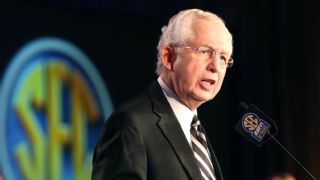|
DESTIN, Fla. -- Storming an SEC court or field just got a lot more expensive. SEC commissioner Mike Slive announced Friday at the conference's spring meetings that a school will be fined $50,000 for the first time fans storm a competition area. The fine increases to $100,000 for a second offense and $250,000 for the third and subsequent offenses.  Previously the fines started at $5,000 for a first offense, jumped to $25,000 for a second offense and were $50,000 for third and subsequent offenses. "This is designed to be a deterrent," Slive said. "This is designed to try to change the culture about rushing the field, understanding that it's viewed by some as a tradition. But it's a tradition that runs into the question of health and safety of not only the fans themselves but the coaches and players." There have been numerous instances lately in which SEC schools have accepted fines after fans stormed the field or court after big wins. Perhaps the most dramatic situation in recent years came after Auburn's last-second football victory over Alabama in the 2013 Iron Bowl, but storming also occurred last season after LSU's win over Ole Miss, Kentucky's win over South Carolina, and Ole Miss' victory over Alabama. Ole Miss was fined $50,000 because the school had been cited in 2012 and '13 for fans storming competition areas. Kentucky was fined $25,000 last year despite previous incidents in 2006 and '07, absorbing a smaller fine because the previous incidents occurred more than three years ago. Perhaps the significant fine increase will persuade schools to take the issue seriously, Slive said. "It's just a way of sending a message. It's a way of communicating to the conference that this is serious," Slive said. "And the money is serious." The new rule eliminates the three-year statute of limitations, so any school with three incidents on its record will face a $250,000 fine for each subsequent offense. "Once you reach the third time, you never go back to an earlier time," Slive said. "And then the commissioner may also apply additional penalties as he or she deems appropriate." Slive and executive associate commissioner Greg Sankey addressed a number of issues Friday as the conference wrapped up its spring meetings: Satellite camps: The SEC may cast its lot with other conferences starting in 2016 regarding satellite camps. The conference does not approve of football coaches attending off-campus camps and will support NCAA legislation to discontinue that practice, but the SEC will allow its coaches to begin participating in such camps next summer if the NCAA does not intervene. "We've proven ourselves unique in many ways," Sankey said. "A satellite camp is, 'Are we going to recruit in the summertime or not off-campus?' That's the essence of the issue, and the understanding of the recruiting calendar is, 'No, we're not going to engage in that behavior.' "But if the NCAA stands on the sideline and allows this to continue, then we'll either need to change the rule formally or simply engage in summer recruiting." Slive accelerates retirement: Although Slive was set to retire as commissioner July 31, he announced that he will hand over the commissioner's title to Sankey effective Monday.  Slive said he will serve in an advisory capacity in the next two months but decided it was important that Sankey be the face of the SEC during the summer's legislative period. "I really think it's in the best interest of the league that we make that transition earlier than [July 31]," Slive said. "And so I approached the presidents and chancellors earlier today and suggested to them that the duties and responsibilities of the commissioner's role be given to Greg (on) June 1." Slive presided over unprecedented success since taking over as SEC commissioner in 2002. He announced Friday that the conference's 14 institutions will receive an average of $31.2 million per school this year off an NCAA-record $455.8 million in revenue. Conference schools have claimed 81 national titles in 19 sports during Slive's tenure, which he called "the best 13 years of my life." "I've always felt that I was just the trustee of a sacred public trust. That's how I think about the league: It's really a public trust, and for a finite period of time, I've been a trustee," Slive said. "And I know it's corny and I know everybody says it, but we're no worse for the wear for me having been here." Financial aid agreement stipulations: To prevent NCAA penalties when prospects enroll elsewhere after signing a financial aid agreement with a school, the SEC approved an NCAA legislative proposal that would prohibit schools from publicizing those signings or taking advantage of allowed extra communication with those prospects prior to the regular signing date for the sport. The NCAA banned LSU from signing early enrollees to financial aid agreements for the next two years and removed 10 percent of its recruiting evaluation days over a case involving offensive lineman Matt Womack. Womack signed a financial aid agreement with LSU last year, and the Tigers coaches took advantage of the unlimited recruiting contact with Womack that is allowed once a prospect signs the agreement. But when Womack later signed with Alabama, the previous unlimited contact with LSU became a punishable recruiting violation. "We were very intentional, because there's a national rule, of saying for the Southeastern Conference, don't engage in additional recruiting behavior because there's not an assurance that someone will enroll," Sankey said. "... What this is meant to do is really to set to where we were nationally two years ago to say you can sign an institutional offer. That doesn't trigger the additional freedom in recruiting that has been present over the last couple of cycles." Early signing period: As Slive stated earlier in the week, the SEC formally reiterated its opposition to an early signing period in football. If one is adopted next month by the Collegiate Commissioners Association at its annual meeting, the SEC will push for it to take place the first Monday after Thanksgiving and "only be applicable to prospects who have not taken official visits." Medical observer: The SEC athletic directors approved adding independent medical observers in the press box for all football games. If the officials or medical staffs fail to notice a player suffering from a possible medical issue like a concussion, the medical observer will have the ability to stop the game to make sure the athlete is attended to.
|

